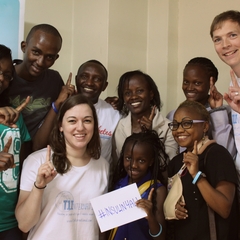
World Health Day: Universal Health Coverage (#healthforall)
6 Apr 2018, 2:27 p.m. in News & Statements by Elizabeth Pfiester
Universal Health Coverage Day, marked annually on 12 December, is the rallying point for the health for all movement. It marks the anniversary of the United Nations’ historic and unanimous endorsement of universal health coverage in 2012.
T1International has been involved in the #healthforall coalition and movement since it began in 2012. In 2016, the Coalition launched a petition calling for recognition of 12 December as Universal Health Coverage Day. In 2017, the United Nations General Assembly passed a resolution that made it official.
Excitingly, the WHO has chosen to highlight Universal Health Coverage in 2018 by choosing it as the theme for World Health Day on April 7th. At T1International, we will use the day to continue to highlight the importance of Universal Health Coverage for people with type 1 diabetes.
In our recent letter to the High-Level Commission on NCDs, T1International and the co-signees expressed complete agreement with the WHO’s support for universal health care. We stressed that this idea is essential to ensure survival and positive health outcomes for people with type 1 diabetes, due to the complexity of the condition and the large variety of supplies and care needed to properly manage the condition.
Diabetes is a chronic condition, so its management can be very expensive for both for patients and health systems. As those of us living with the condition know, managing type 1 diabetes requires an extensive array of tools and education, including insulin, blood glucose monitoring, ketone testing, glucagon kits, diabetes education, access to healthcare professionals, and treatment for complications. Access to these necessities on a continuous basis is unavailable in many countries around the world, so plans to ensure ongoing provision of them is essential.
As Emma Kaltman wrote in Diabetes Voice: ‘‘Generally, less-resourced countries have basic public health systems that are free or provide services at a minimal cost, and cover most of the population. Yet, various needed diabetes care components are not usually provided due to high costs.’’
She explains, ‘‘When care components are not supplied in public health systems, they must be accessed at premium prices at private pharmacies and paid for as out-of-pocket expenditures.’’
We have worked with individuals and communities who face the impacts of high out-of-pocket spending regularly. Many spend upwards of 50% of their monthly income on diabetes expenses, struggling to afford insulin and only testing their blood glucose levels a few times a month.
‘‘At times I had to borrow money to buy my insulin, and I missed my clinics because I couldn't afford the consultation fees,’’ Cate from Kenya told us.
A respondent to our ongoing 2018 survey from Peru said: ‘‘The analyses every three months are expensive and I must pay out of pocket. Emergency insurance or strips are not covered. I cannot access a pump or pay for the cost of a glucose monitor.’’
Thus, at T1Interantional we know that an essential step towards universal health care is ensuring continued access to insulin and other diabetes supplies and care.
As outlined in the aforementioned letter, we propose a few clear solutions to begin to address the multi-faceted issues related to providing universal health coverage for people with type 1 diabetes:
- 1.Support the development of diabetes registries, particularly in low-income countries, to understand the scope of the problem and find the best solutions to address it
- 2.Include insulin and diabetes supplies in emergency kits of UN agencies
- 3.Bring the price of insulin and essential supplies down using methods similar to those used to enable widespread ART treatment in HIV/AIDS
- 4.Engage humanitarian and development organizations, specifically patient-centered advocacy organizations
We urge global health organizations to ensure that additional attention and resources are dedicated to access to medication, care and treatment for people with type 1 diabetes.






